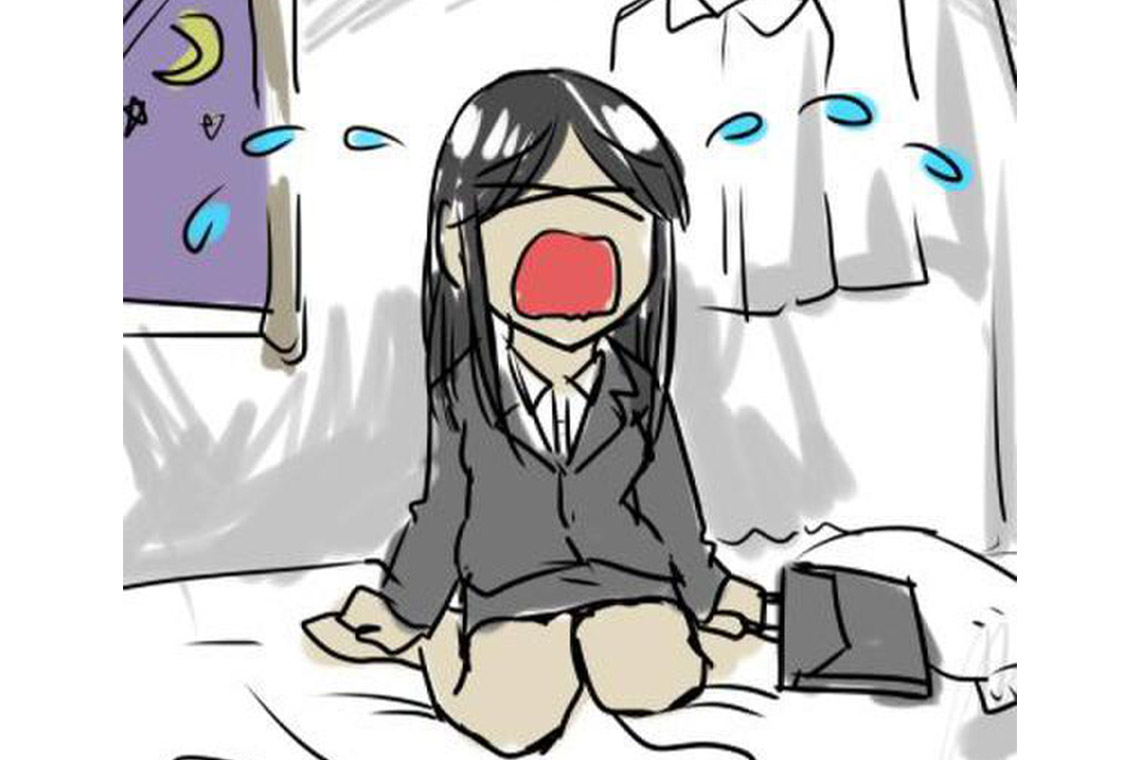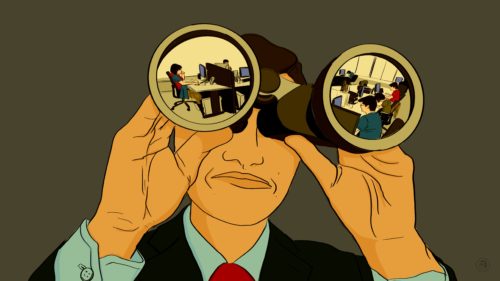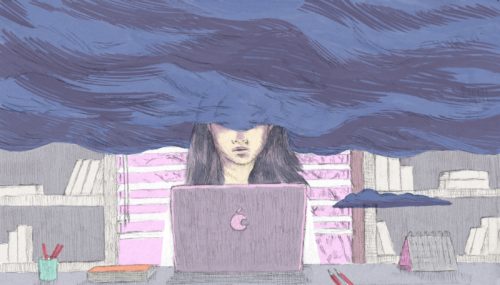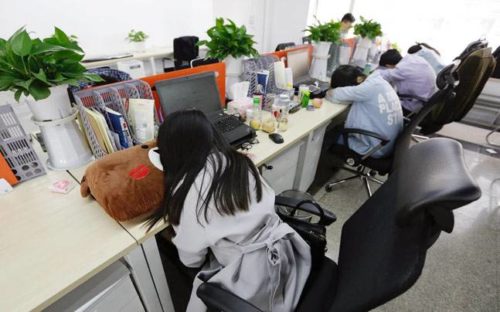News roundup: Gloomy Chinese white-collar workers
Top China news for January 6, 2017. Get this daily digest delivered to your inbox by signing up at supchina.com/subscribe.

Gloomy Chinese white-collar workers
Founded in 1997, Zhaopin.com was the first recruitment website in China, and is still one of the biggest players in that sector. This week, the company published the result of a survey of “more than 12,000 white-collar workers” about their jobs and life satisfaction. The survey was carried out for public relations purposes, so the findings should be taken with that in mind, but they paint a rather dismal picture of office life in urban China:
- Most respondents were dissatisfied with promotion opportunities in 2016; nearly 80 percent of survey respondents did not get a promotion.
- Almost 40 percent of the respondents did not take any vacation in 2016.
- White-collar workers were highly dissatisfied with their sexual activity level. More than half of respondents had sex less than once a month in 2016.
Aside from the general levels of dissatisfaction, one of the interesting findings is that of the 34 cities surveyed, none of China’s four first-tier cities (Beijing, Shanghai, Guangzhou and Shenzhen) were among the top 10 in job satisfaction. However, respondents in “some emerging first-tier cities and second-tier cities, including Guiyang, Jinan, Dalian, Foshan, Wuxi and Suzhou,” reported high job satisfaction. The report attributes this to “fast economic growth… better job opportunities, relatively low living costs and less competition” in the smaller cities.
Today on The China Project
As a follow-up to last week’s Sinica Podcast with Ian Johnson on the warming of ties between the Catholic Church and the Chinese Communist Party, we ask Ian about new developments in China-Vatican relations. On the subject of the Catholic Church and China, we also publish a short item on the strange story of the Mao Zedong painting that hung for a time in the Vatican.
In case you missed them, this week we published two special features: “Spurning China and courting Russia: Trump’s dangerous game,” Kaiser Kuo’s latest monthly column, and “Cashing in on dystopia,” a piece by David Bandurski on the astonishing array of personal data on Chinese citizens available for purchase at a modest fee.
This week’s news roundups are:
- January 3: China bans ivory trade, Trump-China update and Bitcoin surges
- January 4: A shooting in Sichuan, and the smog abides
- January 5: Government pledges to reduce ‘irrational’ spending on soccer
More China news is curated below, with summarized stories at the top of each section.
BUSINESS AND TECHNOLOGY:
- China’s airpocalypse paves a path for new cancer medicines / Bloomberg
Lung cancer is the most common type of cancer in China, with more than 700,000 new cases of the disease in 2015. It’s a huge problem for the Chinese health-care system but also a potential boon for Chinese companies like Betta Pharmaceuticals and Hutchison China MediTech, which Bloomberg says “are attempting to build blockbuster treatments.” Both companies are investing heavily in treatments for lung cancer and have been rewarded on the stock markets with soaring evaluations. - China ready to step up scrutiny of U.S. firms if Trump starts feud / Bloomberg
“China is prepared to retaliate should President-elect Donald Trump take punitive measures against Chinese goods and trigger a trade war between the world’s two biggest economies, according to people familiar with the matter.”
- China’s central bank guides yuan higher at fastest pace since 2005 against dollar / CNBC
- Through rally or crash, here’s why bitcoin buyers are nervous about China / Bloomberg
- China & Hollywood: What lies beneath and ahead in 2017 / Deadline Hollywood
POLITICS AND CURRENT AFFAIRS:
- DEA chief to visit China for talks on synthetic drugs / CNN
The head of America’s Drug Enforcement Agency is visiting China to discuss banning lab-produced drugs that are being manufactured there but sold in the United States for recreational use. He will meet with his Chinese counterparts in narcotics, customs and border patrol, and the justice department. “The visit comes after a productive 18 months for Chinese-American relations on the subject of combating synthetic drug sales,” Sara Ganim reports. - Chinese rights lawyer Xie Yanyi released on bail more than a year after crackdown / SCMP
A prominent human rights lawyer was released on bail yesterday after a year and half in detention in a crackdown on activist lawyers. “Xie Yanyi was among hundreds of people detained in the so-called ‘709’ crackdown, referring to the date in July 2015 when the arrests began,” Mimi Lau writes. He was charged with subverting state power in January 2016 in Tianjin, a port city near Beijing. The terms of his release and bail are not clear.
- Xi Jinping is busy arranging a huge reshuffle / The Economist
- China vows ‘zero tolerance’ for election fraud in upcoming party congress / Reuters
- China state tabloid scolds New York Times for investigative reports / Reuters
- Opinion: Cambodia wants China as its neighborhood bully / Foreign Policy
SOCIETY AND CULTURE:
- China’s growth breathes new life into old ghost towns / The Globe and Mail
“Ghost city” is a term used to describe new urban developments in China that remain empty after completion. They are a popular topic of economic pessimists and make good subjects for photo essays depicting massive but unpopulated apartment complexes. But there is more and more evidence that many of these ghost cities are now full of residents. In the Globe and Mail story linked here, Nathan VanderKlippe reports on Tianducheng, once used as a surreal location for a music video because it was completely empty but now facing a different problem: “There are hardly any apartments left for sale here,” says one resident. - How the Qing court sowed the seeds of environmental protection in China / NYT (paywall)
An interview with Jonathan Schlesinger, author of the book A World Trimmed With Fur: Wild Things, Pristine Places, and the Natural Fringes of Qing Rule, on the protected natural areas and limits on harvests “in response to environmental degradation” enacted by the rulers of the Qing dynasty (1644-1911).
- ‘Yeti’ prints suggest humans settled in Tibet more than 7,000 years ago / WSJ
- How China uses Shakespeare to promote its own bard / The Economist
- Ice palaces and neon slides at China’s ice festival — in pictures / The Guardian
WEI WATCH:
Keep an eye on what’s buzzing among China’s 700 million social media users.
Saucy cooking show removed from the internet / Weibo (link in Chinese)
In the last few days, a popular online cooking show named Sister Is So Hungry, which premiered in August 2016, disappeared from the Chinese internet. Hosted by “Little S,” also known as Dee Hsu, the show features flirtatious interactions between the hostess and handsome male guests. In a Weibo discussion thread (in Chinese), some users question why the show has been taken offline while others applaud the decision, saying, “These rubbish shows that use vulgar content shouldn’t have been online in the first place.”





